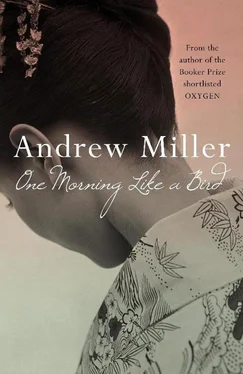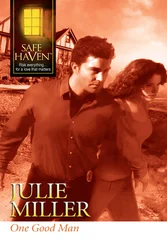He stops by the bank of the moat opposite the boat-rental pier and looks down at his reflection, an outline that could be almost anyone’s. Between the drifting willow leaves, bubbles break the water’s surface. Something is down there, some bony fish or other, dull in its own dull kingdom. He turns away, and to protect himself a little from his own interest in money, to distract himself from the nagging fear he may not be quite as exceptional as he once believed, he conjures up the spirit of Arthur Rimbaud striding along a country road to Paris, crazy grey eyes, his pockets stuffed with paper, a poetry so pure everyone will either fall in love with him or want to murder him. .
At home, lunch is ground beef and grated yam. Father has carried his food out to the garden study to continue, undisturbed, his reading in those volumes of archaeology that are his new obsession. The Jomon Era, the Yayoi, the far edge of history. Cultures that have to be imagined from shell-mounds, fragments of terracotta. Yuji eats with Miyo in the Western room. After lunch she shows him a beauty magazine she has borrowed from one of the other serving girls in the neighbourhood. In an article called ‘Please Be Proud of Your Japanese Skin’ there is a character she cannot read. It is, he says, the character for ‘fate’ or ‘the path you are obliged to follow’ or ‘the unrefusable way’ or, to put it plainly, ‘the unavoidable’, ‘the inevitable’. Also, perhaps, ‘submission’. She thanks him, then hearing Haruyo slide open the door of Mother’s room, she hurriedly rolls the magazine and thrusts it inside her kimono, between her little breasts.
Rain, then sleet. Yuji hurries through the door of the bathhouse, stows his umbrella, picks at the knots in his laces, tugs off his boots, examines the fringes of wet sock where his boots have leaked, puts the boots into an open locker, and greets Mrs Watanabe, who bows and tells him that his friend, that nice young man, arrived ten minutes ago, something Yuji already knows, having just seen Taro’s leather brogues drying in the locker above his own.
In the next room, he strips, takes his towels and slides open the door to the baths. The bathhouse has been here since before the Great Earthquake (the boast is that they only closed for a week), a shadowy place, slightly shabby and not, perhaps, as clean as it should be, but for its customers its dereliction is its charm. They would go nowhere else.
There are only six or seven this side of the screen, and on the other side, to judge from the light voices that float under the ceiling on steam clouds, a few more. Taro is perched on an upturned bucket, a towel round his neck. Yuji joins him, scrubs Taro’s back. Taro scrubs Yuji’s. Clean, they climb into one of the baths (not the hottest, nor the one with the swaying bag of medicinal herbs). They shut their eyes and sigh.
‘Junzo?’ asks Yuji.
‘Mmm?’
‘Junzo?’
‘Supposed to be here.’
‘Ah.’
‘Mmm.’
It’s twenty minutes before Junzo arrives. Yuji, with one ear cocked to the cooing and chattering of the women — he knows Kyoko sometimes comes to Watanabe’s — watches him washing at the tap and thinks how easy it would be, through the steam, like looking through the fine linen of a mosquito net, to take him for a boy of thirteen or fourteen, though only two months ago they celebrated his twenty-first birthday at the billiard parlour on the Ginza, a raucous and beer-drenched occasion, half the philosophy class from Imperial there, singing or spewing . . . He has rarely traded schooldays stories with Junzo but can imagine well enough how things might have been. Did he too have to marry himself to a creature like Saburo, or did brains and little-dog fearlessness and having Taro at his back keep him safe? For so much better made is the elder brother than the younger — who seems, by comparison, to have been stitched together from whatever was left over, the trimmings — even big-fisted Saburo would think twice before taking him on. When Taro was called up for his year of service (it was 1935 and still, despite the best efforts of the military, a time of peace), he was barely out of basic training before they were using him to put some muscle on the city limbs of the new intakes. Barracks judo champion, a sprinter, a notable swimmer, he never even had to leave Tokyo. Just the type the army is always hungry for, the sort who makes them look the way they like to imagine themselves — virile, graceful, natural conquerors.
A different story when they are faced with material like Yuji or Junzo. Then they feel offended, and something wild comes into their eyes. Captain Mori, the officer who, in the July of Yuji’s twentieth year, examined him in the gymnasium of a high school in Hongo, had particularly expressive eyes, and for three minutes, as Yuji stood in his underwear in front of the desk, the captain had stared at him with such a concentration of contempt it was as if all the oxygen was being sucked out of the room. Between them, on the gymnasium floor, was a sixteen-kilo burlap sack of rice. The captain ordered Yuji to lift it over his head. Yuji, bending, gripping two burlap ears, dragged the sack to his waist, swung it towards his chest, and for a second seemed to have it there safely, before some lapse of will, some failure of technique, sent it plunging to the floor again, where it landed with such a thud it startled into flight a pair of horseflies mating on the tip of the captain’s swagger stick. He was made to try twice more. The last time, he could hoist the sack no higher than his thighs, and at this, this failure, this sickening display , the captain sprang from behind his desk. Despite the heat, he began to demonstrate a callisthenics routine, performing the moves as if tearing to shreds an invisible mattress. Black moons appeared beneath the arms of his field shirt. After a minute he stopped (he was not so fit himself), snorted, mopped his face, and informed Yuji that the army would rather have a schoolgirl than him, it would rather have a Korean , it would rather have . . Yuji, head bowed, kept his gaze on the desk. In the open file he could see Dr Kushida’s letter, typed on clinic stationery, a large military stamp on the top left corner. Approved? Not approved? The captain sat down, rocked on the rear legs of his chair and lit a cigarette. To his NCO he said (no longer shouting, no longer interested), ‘Mark this hero down Class F. Health grounds. Case to be reviewed in twelve months . .’
He has never been recalled. Nor — as long as Kushida could be relied upon to send his annual letter — did he think it likely he ever would be. Why should the Emperor burn such crooked timber as Yuji Takano or Junzo Miyazaki — for Junzo, along with his student deferment, has a Class D — when each year another half-million boys turn twenty and repopulate the empty parade grounds? But this was before the fighting at the Khalka river, the fighting at Changsha, the casualties at Changsha, the defeat at Changsha, the calls for a new offensive, an invincible tide of fighting men to sweep away the nation’s enemies once and for all. Would half a million be enough for that? A million? Last month Ozono’s son, who can barely see across the street without his glasses, received his red paper. How long, then, before everyone was equally suitable, and some functionary at the War Ministry placed quite a different stamp at the top of the doctor’s letter?
Pink from the heat of the baths, they retire to the matted room upstairs, a little mah-jong hall old Watanabe, in a brief and long-since dissipated mood of entrepreneurial ambition, took over on the death of the previous owner. The maid brings the young men beer and salt crackers. As they start to drink, Junzo, to explain his late arrival and the green bruise on his cheek the water has brought out, tells the others about the book fight in the corridor of the philosophy building, the Hegel gang versus the Schopenhauer gang. His bruise was The World as Will and Idea glancing off his cheekbone, a blow he repaid with volume three of The Science of Logic that split open his opponent’s lip.
Читать дальше












